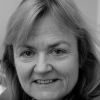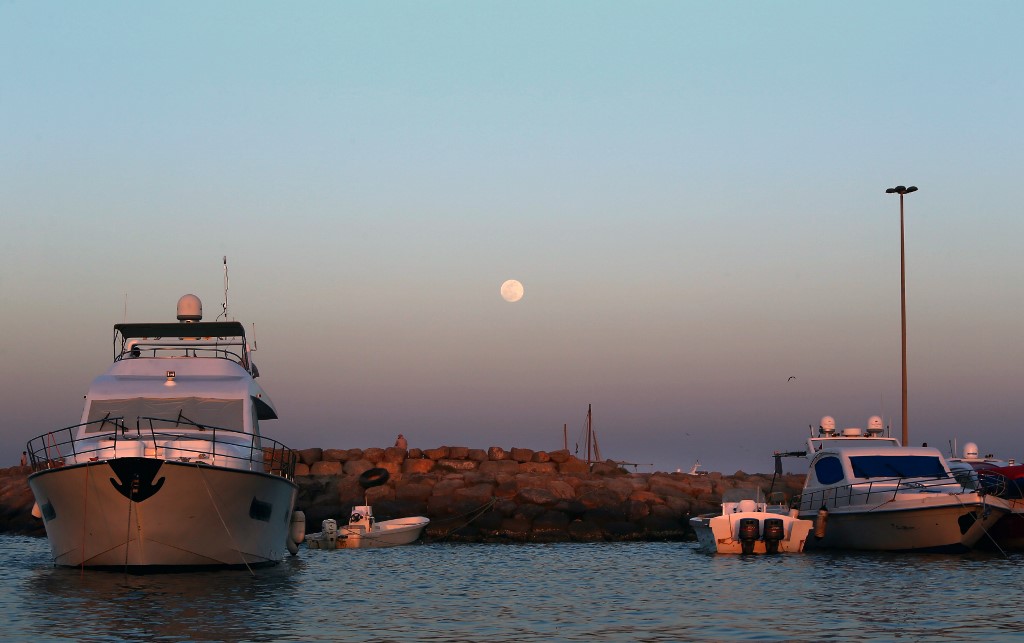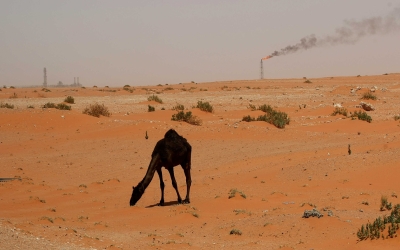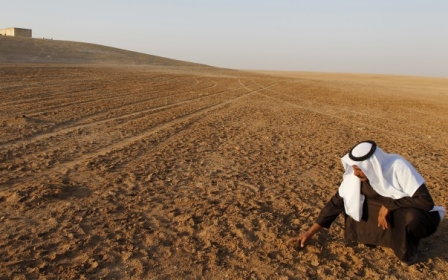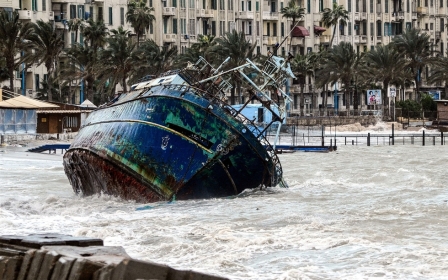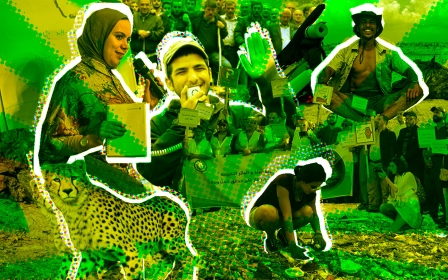Is Sharjah really the 'green and virtuous' emirate?
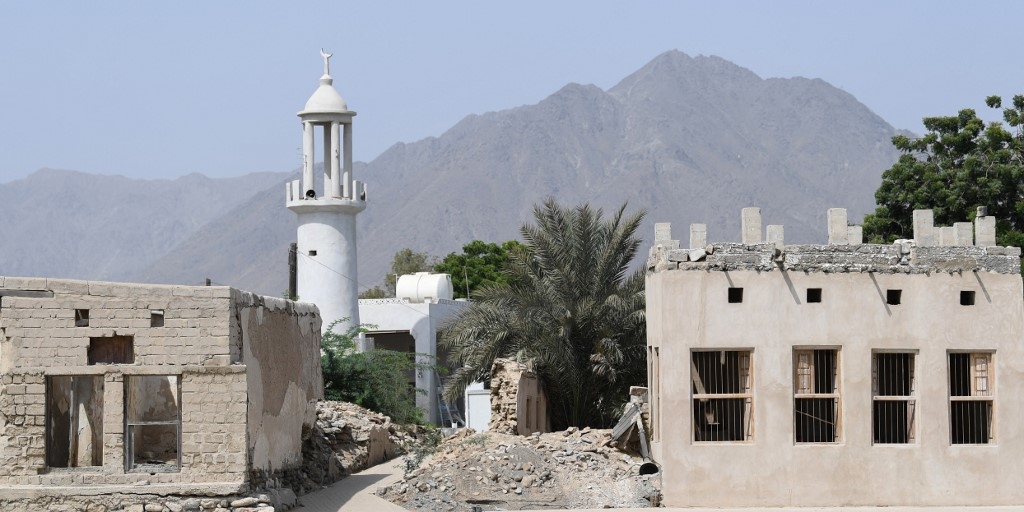
As I floated in the balmy waters of the Gulf last month, the clammy embrace of a plastic bag reminded me that even Sharjah, the self-proclaimed "eco-emirate" and "cultural capital" of the UAE, cannot control the sea.
On land, its 80-year-old ruler has always tried to steer a more enlightened course than the other six emirates. With a total ban on alcohol, it is also the "dry" emirate, free from the boozy brunches and cocktail-fuelled nightclubs of neighbouring Dubai.
I lived in the Emirates during the booming 90s, and everyone says life is much harder now - less work, lower salaries, higher costs. So how is green and virtuous Sharjah coping in today's cut-throat commercial world?
A delicate relationship
Many of Sharjah's museums are clustered in town around the Book Roundabout, but my favourite, the Natural History Museum, is set all by itself in the desert beyond the new airport. It tackles no less a subject than creation itself, using hi-tech to the full, bombarding all the senses.
New MEE newsletter: Jerusalem Dispatch
Sign up to get the latest insights and analysis on Israel-Palestine, alongside Turkey Unpacked and other MEE newsletters
At the entrance, a Quranic quote proclaims: "Assuredly the creation of the heavens and the earth is a greater matter than the creation of man: yet most men understand not."
To digest such profundity, I sat in the cafe on a recent visit, just as before, eating organic cake, watched by hungry wolves on the other side of a window - they are in the open, while the humans are confined.
New labels tell of endangered species, giving facts and figures - but there is not a word about the hunting pastime that brought them to extinction
The whole concept was the brainchild of Marycke Jongbloed, a Dutch expat physician and nature-lover who became one of UAE's first environmentalist. In 1991, she published her eye-opening Green Guide to the Emirates, detailing how to avoid damage to wildlife habitats during aptly named "wadi-bashing" excursions in four-wheel-drives.
She explained how the delicate relationship between animals, plants and man in the desert had remained undisturbed for centuries, but the advent of the rifle changed that balance forever.
The last wild oryx was wiped out in 1972, hunted for sport. Motorised hunting parties with dozens of vehicles would slaughter whole herds. After no such sport was left in their own countries, Arabian princes and their entourages went instead to kill the wildlife of other countries, such as Jordan and Iraq, where a Qatari hunting party was caught (and eventually ransomed) as recently as 2015.
Jongbloed left long ago, and her Green Guide is out of print, but the oryx, gazelle, tahrs and Arabian leopards live on in the museum and adjacent breeding centre. New labels tell of endangered species, giving facts and figures - but there is not a word about the hunting pastime that brought them to extinction.
The houbara bustard fixes me, the only visitor, mistrustfully with his beady eye, and who can blame him?
Culture and environment
In pre-oil days, Sharjah was wealthier than either Abu Dhabi or Dubai, thanks to a bustling trading port at its creek, which was the headquarters of the powerful Qawasim seafaring tribe.
Earlier in the 20th century, Sharjah was also the headquarters of the British-sponsored Trucial Oman Scouts, and had an RAF base and a residence for the British political agent, the title that was used for the official British representative in the days before embassies and consulates.
As such, it had a stronger British presence than any other emirate, thanks to the ruler's agreement in 1932 that allowed the British to build an airstrip, the UAE's first. This brought Sharjah valuable extra revenue at a time when the pearling industry had virtually ceased due to the arrival of Japanese cultured pearls.
Oil was discovered in Sharjah in commercial quantities in the 1970s, enough to enable it to improve its infrastructure. But it remains poorer than many of its neighbours, forced to diversify while struggling with rapid urbanisation and high population growth.
On my latest trip, I spoke to as many young Sharjans as I could about their culture and environment. Not a single one had even heard of the Natural History Museum. What excites Emirati youth, I discovered, was global culture, and especially international sports celebrities - many of whom, ironically, in a perverse reversal of the Arabian hunting parties, are being lured by hefty prize money to come and play in fancy new venues in Dubai and Abu Dhabi.
Sharjah can't compete on that front, but it scores surprisingly higher on churches and Russians. There were always a few back in the 90s, but now there are lots. The biggest church, not just in Sharjah but in all of the UAE, is the Russian Orthodox, with capacity for 20,000 worshippers, in elegant Byzantine architecture complete with turquoise onion domes.
Hundreds of thousands of Russians a year now visit, lured not just by the churches but also by the cheaper hotels, lower rents and tax-free fur coats.
Falling on deaf ears
Today's version of Marycke Jongbloed, Swedish activist Greta Thunberg, would suffer heart failure if ever she came to the Gulf.
The UAE's climate policies have been called out as "highly insufficient" by the independent Climate Action Tracker. Per capita, the UAE has one of the biggest carbon footprints in the world and one of the highest waste generation rates.
Moves are afoot to counter that image, with Dubai's "Sustainable City" and another planned in Sharjah, but this might just be PR.
Thunberg has accused world leaders of "clever accounting and creative PR" to make it look as if they are doing something to combat climate change, while in practice doing little. Dubai could give a masterclass in such skills.
The campaign to promote Expo 2020, billed as "the world's greatest show," is in full swing under the slogan "Connecting Minds, Creating the Future," with a major sub-theme of "sustainability".
The pioneering Jongbloed hoped that education was the key - that her Green Guide would change behaviour, teaching people to understand the desert. "And if you become thus involved," she wrote, "surely you will not leave plastic bags, bottles and cans lying around."
Decades later, the proliferation of plastic, on land and at sea, suggests her message - and Thunberg's - are still falling on deaf ears.
The views expressed in this article belong to the author and do not necessarily reflect the editorial policy of Middle East Eye.
Middle East Eye delivers independent and unrivalled coverage and analysis of the Middle East, North Africa and beyond. To learn more about republishing this content and the associated fees, please fill out this form. More about MEE can be found here.


